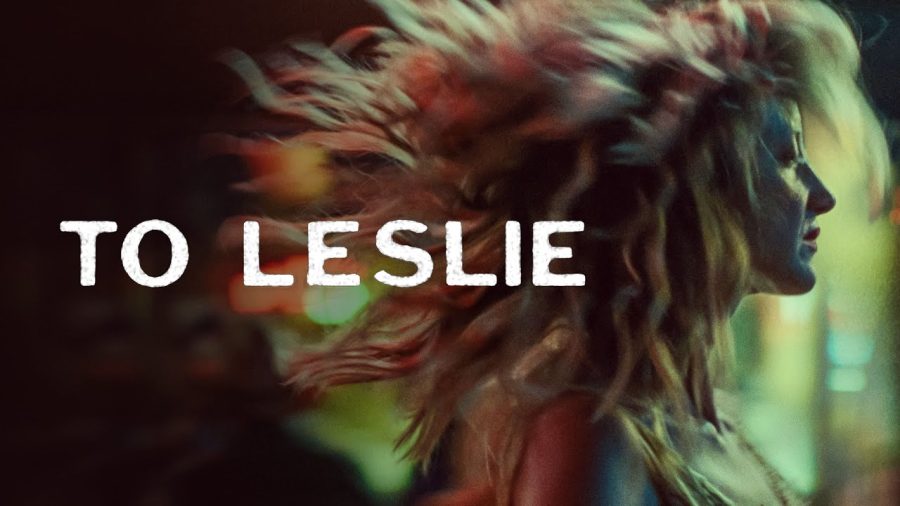“To Leslie” Review
An unflinching portrayal of addiction without the predictable beats of a recovery story.
February 13, 2023
Leslie (Andrea Roseborough) is kicked out of her hotel. Considering who she could go to for help, she asks to live with her 19-year-old son James, played by Owen Teague.
Owing to the need she has to satisfy her appetites, after earning Owen’s trust, Leslie rummages through his belongings looking for cash to buy some liquor. When Owen finds out, she’s forced out and must stay with old friends-turned-enemies Nancy (Allison Janney) and Dutch (Stephen Root), who had to take care of her son after she abandoned him to live a life of substance abuse. The day after arriving, Leslie starts drinking again, and is shoved off without a home.
“To Leslie” is a movie about an alcoholic mom dealing with the aftereffects of winning $190,000 in a lottery, which triggered her downfall. In it, the lottery win is used to ridicule Leslie for her lifestyle after winning, for leaving her son with the few real friends she had and to remind her of how she has hurt all of them.
A great shot showcasing the movie’s cinematography is Leslie, walking from the local laundromat to the bar, catching the sights and sounds along the way, but the camera stays focused on her. In another example, the camera remains focused on Leslie for the entirety of the movie – this is truly a character study. Her internal conflicts are palpable, going from pain in her bed while going through withdrawal to grabbing her coat at the thought of leaving for a drink and then immediately returning to her room, her conscience intact. We see everything that goes through her mind.
The town is a modern, southern community somewhere in the heart of Texas, I assume, with small town fairs, rockin’ country music, heart wrenching ballads, cowboy hats, jeans, leather and a lot of swayin’ and dancin’.
The script is excellent. Everything that needs to be shown is shown, and everything that needs to be said is straightforward and has a clear purpose and meaning, with little exposition necessary. As an example, later in the film we learn that Sweeney, the kind and lovable hotel operator who takes Leslie in, has had addiction in his life too, only as an observer, and so his empathy and actions are made that much more understandable and real. It’s an expected turn, given his overly kind treatment of Leslie, and comes as part of his life, something that had been teased up until then. Sweeney has a different perspective as someone who has witnessed addiction, one that’s unconditionally loving and has less of a history with Leslie compared to Nancy, Dutch and James.
Something I admire about this movie is that it isn’t the usual recovery story. There is little mention of the 12 Steps or AA or NA. It’s only by her own choice, after so much rejection and reflection that Leslie chooses to give up drinking.
Near the end of the film at the local bar where Leslie won her spent fortune, we see another great scene in which she contemplates returning to her old ways. A handsome barmate gestures that he’d like to do more than talk. Faced with the dilemma of using him for her own whims, Leslie asks the man at the bar if there’s anything good about her, teary eyed. Sincerely, squinting his eyes, the man returns, “Yeah, you’re good.” Returning to the hotel, Leslie decides to turn the ice cream shack into something vibrant, akin to what she’s trying to do with herself.
A choice that caught me off guard because of how up-front the movie had been thus far was when it transitioned eight months into the future to see how Leslie’s situation has changed. The ending, which follows this transition, felt heart-warming but awkward. It was a necessary decision to progress her relationship with her son, but it didn’t flow as well as the rest of the movie. On a side note, eight months passing compared to the time-span the film covered is enormous. It tells me that I’ve lost a lot as an audience member.
But, it can only be assumed that she was that way before, only that the lottery gave her a false sense of hope that she would do something better with her life. This is added upon in another great scene where Leslie confronts Nancy at the town fair, screaming, “And what did you do to fucking stop me?” From that, as well as Leslie’s overall behavior in the film, she was as directionless before she won the lottery as she was after, and her friends didn’t change that.
Roseborough’s portrayal of Leslie, someone who is unbearably flawed, gives this move its strength, and offers something that anyone who has ever been witness or victim to addiction could find solace and hope in. The movie’s available on Vudu, Amazon Prime Video, YouTube Movies, Apple TV, and Google Play.




















